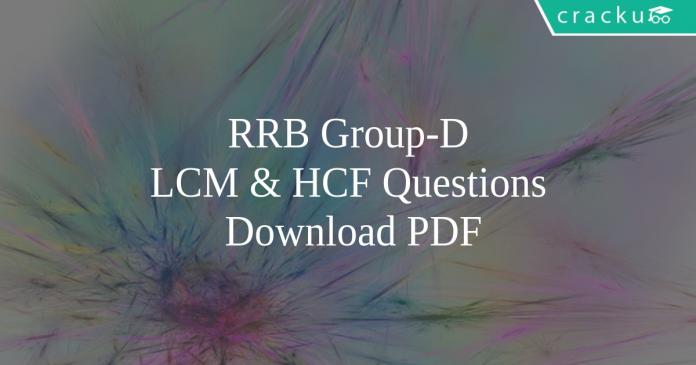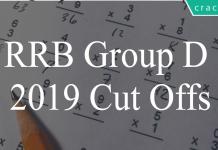RRB Group-D LCM & HCF Questions PDF
Download Top 15 RRB Group-D LCM & HCF Questions and Answers PDF. RRB Group-D Maths questions based on asked questions in previous exam papers very important for the Railway Group-D exam.
Download RRB Group-D LCM & HCF Questions PDF
Download RRB Group-D Previous Papers PDF
Take a RRB Group-D free mock test
Question 1: Find the LCM and HCF of 0.25, 0.5, 0.75
a) 1.5, 0.25
b) 2, 1
c) 1.5, 0.5
d) 3, 1
e) None of these
Question 2: Find the HCF of 120, 150,180
a) 30
b) 60
c) 50
d) 10
e) None of these
Question 3: Find the HCF of 1/2 and 3/2
a) 3/2
b) 1/2
c) 1
d) 3
e) None of these
Take a free mock test for RRB Group-D
770 Mocks (cracku Pass) Just Rs.199
Question 4: Find the least number which is exactly divisible by 12, 15, 20 and 27.
a) 650
b) 520
c) 600
d) 540
e) None of these
Question 5: The HCF of two natural numbers a and b is 7 and a/b = 1.5. What is the value of a*b?
a) 224
b) 1176
c) 294
d) 304
e) None of the above
Question 6: The LCM of two numbers x and y is 20. Find the number of unordered pairs (x,y)?
a) 8
b) 9
c) 7
d) 10
e) None of the above
RRB Group D previous year papers
Question 7: The ratio of two numbers is 5:6. The product of the HCF and LCM of the two numbers is 120. What is the HCF of the two numbers?
a) 2
b) 4
c) 6
d) 8
e) 1
Question 8: The sum of two numbers is 65 and the HCF of the two numbers is 5. If the LCM of the two numbers is 180, what is the sum of the reciprocals of the two numbers?
a) 11/13
b) 11/625
c) 13/625
d) 11/180
e) 13/180
Question 9: The least number which when divided by 3,5 and 7 leaves a remainder 2 and is divisible by 2 is:
a) 212
b) 210
c) 424
d) 106
e) none of the above
Question 10: The two numbers 15 and x have their LCM as 150. If the HCF of two numbers is 5, what could be the value of x?
a) 75
b) 45
c) 30
d) 50
e) 10
RRB Group-D Important Questions (download PDF)
Question 11: The two numbers are in the ratio 5:9. If HCF of two numbers is 7, what is the value of the LCM of the numbers?
a) 630
b) 165
c) 315
d) 195
e) None of these
Question 12: The LCM of two numbers is 360, and their HCF is 15. If one of the numbers is 45, what is the value of the remainder when the other number is divided by 7?
a) 1
b) 2
c) 3
d) 4
e) 0
Question 13: Which is the largest number that leaves a same remainder on dividing 640, 960 and 1120
a) 20
b) 40
c) 80
d) 160
e) 320
Question 14: What is the HCF of 221, 323, 391 and 289?
a) 13
b) 17
c) 19
d) 21
e) 23
Question 15: What is the LCM of the following fractions? ⅔, 4/7, 1/4
a) 1
b) 2
c) 4
d) 7
e) 8
General Science Notes for RRB Exams (PDF)
Answers & Solutions:
1) Answer (A)
LCM of 0.25, 0.5 and 0.75
he given numbers can be written as of 0.25, 0.50 and 0.75
Now ignoring the decimals we find LCM of 25, 50, and 75
5 | 25, 50, 75
5 | 5, 10, 15
| 1, 2, 3
∴ LCM = 1 × 2 × 3 × 5 × 5 = 25 × 6 = 150
LCM = 150.
Similarly we will find out the HCF for 25, 50 and 75.
Since given numbers are not high, we can follow Prime factorization method to get the HCF easily
25 = $5^2$
50 = $2\times5^2$
75 = $3\times5^2$.
As discussed before HCF = $5^2$ = 25.
Now we got LCM = 150 and HCF = 25, now after putting decimal places as per given in the question the LCM = 1.5, and HCF = 0.25.
2) Answer (A)
since given numbers are not high, we can follow Prime factorization method to get the HCF easily
$120 = 2^3 * 3 * 5$
$150 = 2 * 3 * 5^2$
$180 = 2^2 * 3^2 * 5$
In Prime factorization method after converting the numbers into product of prime factors, take the common factors from all the numbers of the least powers.
Therefore HCF is 2 x 3 x 5 = 30
3) Answer (B)
HCF of 1/2 , 3/2 = (HCF of 1 and 3)/(LCM of 2 and 2) = 1/2
4) Answer (D)
Required number
= LCM of 12, 15, 20 and 27 = 540
5) Answer (C)
Let a = hx and b = hy.
h = 7 and x/y = 1.5 = 3/2
So, x = 3 and y = 2
a*b = 21*14 = 294
6) Answer (A)
The pairs of numbers are (1,20), (2,20), (4,20) , (5,20) , (10,20) , (20,20) , (4,5) , (4,10). So, the number of unordered pairs is 8.
7) Answer (A)
Let the two numbers be 5h and 6h where h is the HCF of the numbers. Product of the numbers = Product of LCM and HCF.
=> $30 h^2$ = 120 => h = 2
So, the HCF of the two numbers is 2
8) Answer (E)
Let the numbers be ha and hb. HCF of the numbers = h and LCM of the numbers = hab.
Sum of reciprocals = (a+b)/hab
h(a+b) = 65
h = 5
(a+b) = 13
hab = LCM = 180
So, sum of reciprocals = 13/180
9) Answer (A)
L.C.M of 3,5 and 7 is 105.
Thus, the required number is of the form 105x + 2.
212 is the lowest such number also divisible by 2.
10) Answer (D)
We have learned a formula which says that
LCM*HCF = product of the two numbers.
So 15*x = 150*5
=> x = $\frac{150*5}{15}$ = 50
11) Answer (C)
Let the numbers be 5x and 9x. Now since 5 and nine are co-prime, the HCF of two numbers is x. It is given that HCF is 7, so x = 7.
Thus the required numbers are 35 and 63.
The LCM of 35 and 63 is 7*5*9 = 315
12) Answer (A)
let the second number be x.
We know that LCM*HCF = Product of the two numbers
So 360*15 = x *45
=> x = $\frac{360*15}{45}$
=> x = 120
Now 120 on being divided by 7, leaves a remainder of 1.
13) Answer (D)
From the properties of HCF, we know that
largest number which leaves the same remainder on dividing x, y and z are given by HCF (x-y, y-z, z-x).
Here x = 640, y = 960, z =1120
So the required number is HCF (960-640, 1120-960, 1120-640)
= HCF(320, 160, 480) = 160
So the required number is 160
14) Answer (B)
221 = 17 *13
323 = 17 * 19
391 = 17 * 23
289 = 17 * 17
Hence HCF of the given numbers = 17
15) Answer (C)
LCM of fractions = LCM of the numerators/ HCF of the denominators.
LCM of 2, 4 and 1 is 4
HCF of 3, 7 and 4 is 1
So, the LCM of the given fractions is 4/1 = 4
DOWNLOAD APP FOR RRB FREE MOCKS
We hope this LCM & HCF Questions for RRB Group-D Exam will be highly useful for your preparation.





